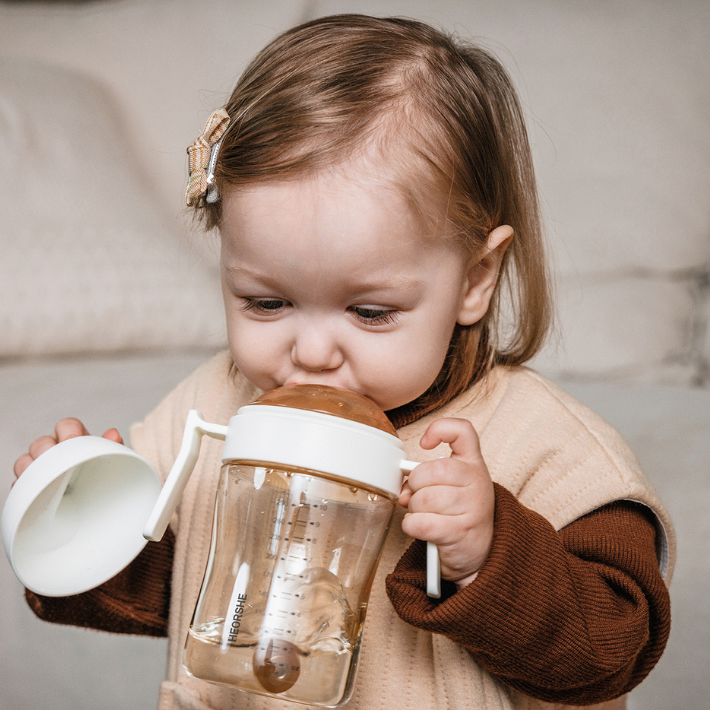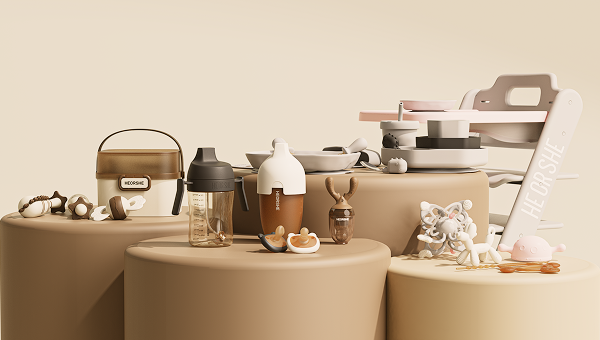When it comes to raising healthy children, one of the key areas of focus is dental health. As babies transition from breast or bottle feeding to using a sippy cup, it's crucial to choose the right one to ensure that their teeth develop properly. The wrong type of sippy cup can have long-term consequences for your child's oral health. In this comprehensive guide, we'll explore how to choose the best sippy cup for teeth development, focusing on essential factors such as design, material, and functionality. Along the way, we’ll dive into why an infant sippy cup with straw might be the best option and how it supports healthy teeth growth.
Why Choosing the Right Sippy Cup Matters for Teeth Development
Introducing a sippy cup is a major milestone in a child’s growth, marking the transition from bottle or breastfeeding to independent drinking. This step typically occurs between 6 to 12 months of age, a critical period for both motor skill development and oral health. While parents often focus on practicality—such as spill-proof designs or ease of use—it’s equally important to consider how the sippy cup affects a child’s teeth and jaw development.
The design and functionality of a sippy cup directly influence a child’s oral health. Cups with hard spouts or restrictive valves can encourage improper sucking patterns, potentially leading to teeth misalignment or overbites. Prolonged or frequent sipping, especially from poorly designed cups, may also expose a child’s teeth to sugary liquids, increasing the risk of cavities.
In addition to the spout design, the material and flow mechanism play a significant role in fostering healthy oral development. Soft, BPA-free materials are gentler on developing teeth and gums, while straws or rimless designs encourage natural sipping motions. Choosing the right sippy cup isn’t just about convenience; it’s about ensuring your child develops healthy drinking habits that support strong, properly aligned teeth and a lifetime of confident smiles.

The Impact of Sippy Cups on Oral Health
A baby’s mouth and teeth are delicate, and the wrong drinking habits can lead to issues that last a lifetime. Here are a few ways sippy cups can impact dental health:
- Misalignment: Cups with hard spouts or valves that require excessive sucking can promote an overbite or other misalignments. These cups can cause the teeth to grow in an unnatural way.
- Tooth Decay: Some sippy cups, especially those with built-in valves that prevent spillage, can encourage children to sip continuously. This constant exposure to sugary liquids, such as juice or milk, can contribute to cavities and tooth decay.
- Mouth Breathing: Cups that are not designed properly can force children to drink in a way that encourages mouth breathing, which can lead to dry mouth and even dental discomfort.
Thus, selecting the best sippy cup for teeth development goes beyond just picking something that prevents spills. The right cup will help foster healthy drinking habits and ensure that your child's teeth grow properly.
What to Look for in a Sippy Cup for Teeth Development
Choosing the best sippy cup for teeth requires attention to several important factors. Below are key features to consider:
A. The Design of the Spout or Straw
The spout or straw is one of the most critical elements when choosing a sippy cup for teeth. For optimal oral health, it’s important to avoid cups with spouts that are too hard or too soft. Cups with a straw tend to be better for a child’s dental health, as they mimic the natural sucking motion of breastfeeding, encouraging proper tongue placement and muscle development.
An infant sippy cup with straw allows the child to control the flow of liquid more easily, which reduces the risk of spilling and promotes healthy drinking patterns. The straw encourages a more natural sipping motion, unlike hard spouts, which can cause children to suck excessively or forcefully.
B. Valve and Flow Control
Sippy cups often come with valves that are designed to prevent spills. While this feature is helpful, it’s important to make sure the valve is not too restrictive. A spout valve that is too tight can make drinking more difficult, forcing children to suck too hard. This excessive sucking can strain their oral muscles and potentially cause long-term dental issues.
When choosing a sippy cup, ensure that the flow is easy enough for your child to drink from without requiring excessive effort. The goal is to encourage a gentle and controlled sipping motion, which is beneficial for teeth development.
C. Material and Safety
The material of the sippy cup is another essential consideration. BPA-free plastics and other non-toxic materials are critical to ensuring that your child’s cup is safe for drinking. Moreover, materials like silicone or soft rubber for the spout or straw can be more gentle on a child’s gums and teeth than hard plastic or metal.
Additionally, cups made from glass or stainless steel are often more durable and may be a better choice as your child gets older. These materials tend to last longer and are less likely to harbor bacteria when properly cleaned.
D. Ergonomics and Grip
At this stage in your baby’s development, they are learning how to hold things independently. Therefore, it’s important to choose a sippy cup that is easy for them to hold. Cups with handles on the sides can be particularly helpful, allowing your baby to grip the cup without difficulty.
The best sippy cups will be lightweight, ergonomically designed, and feature easy-to-grip handles that are comfortable for small hands. A good grip helps your baby develop fine motor skills while drinking, which is an important milestone in their development.
E. Ease of Cleaning
Parents often overlook the ease of cleaning when selecting a sippy cup, but this is an important consideration. Cups with many small parts, such as valves and straws, can be difficult to clean thoroughly, leading to bacteria build-up. Choose a sippy cup that can be easily disassembled and cleaned, preferably in the dishwasher.
Some cups come with extra features, such as wide openings, which make it easier to clean the inside thoroughly. A well-maintained sippy cup will ensure your baby drinks from a safe and hygienic source.
Why an Infant Sippy Cup with Straw is Ideal for Teeth Development
As mentioned earlier, an infant sippy cup with straw is often the best option for supporting healthy teeth development. Here’s why:
A. Mimics Breastfeeding
The sucking motion required for using a straw is similar to breastfeeding, which is the most natural way for infants to drink. This similarity helps babies transition smoothly from breastfeeding or bottle-feeding to using a sippy cup without disrupting their oral development.
B. Supports Proper Oral Muscle Development
Straw drinking encourages babies to use their oral muscles in the correct way, promoting the proper development of their teeth and gums. This motion is also important for helping children develop the coordination needed for speaking and eating solid foods later on.
C. Reduces the Risk of Tooth Decay
Unlike spouts that may encourage sipping continuously, a straw sippy cup often requires more effort to drink. This controlled sipping minimizes the risk of liquid pooling around the teeth, which is a major contributor to tooth decay.
Recommended Sippy Cups for Teeth Development
Now that you understand the key features to look for, let’s explore some of the best sippy cups for teeth development:
1. HEORSHE Dental-Care Sippy Cup
When developing the Dental-Care Sippy Cup, HEORSHE carefully accounted for tooth alignment, creating a uniquely designed teat featuring a "small wing." This innovative feature helps babies evenly distribute the sucking force, reducing pressure on individual teeth and the jaw, promoting healthy and balanced tooth growth.

2. Munchkin Miracle 360 Trainer Cup
The Munchkin Miracle 360 Trainer Cup is a great option for toddlers. This cup features a spill-proof design and a soft, flexible rim that is gentle on little teeth. The 360-degree drinking edge encourages a natural sipping motion, making it an excellent choice for healthy oral development.
3. Philips Avent My Bendy Straw Cup
The Philips Avent My Bendy Straw Cup is designed with a soft, bendable straw that is perfect for babies transitioning from bottles to cups. This cup is ergonomically designed, easy to hold, and features a spill-proof valve. The straw design mimics natural sucking and helps babies drink in a way that is gentle on their teeth.
4. NUK Learner Cup
The NUK Learner Cup is another excellent choice for supporting healthy teeth development. It comes with a soft spout and handles that make it easy for babies to hold. The valve design prevents spills while promoting healthy sipping habits.
5. Playtex My First Sipster Cup
The Playtex My First Sipster Cup features a soft, flexible straw that encourages a natural sipping motion. It is designed to be gentle on your baby’s gums and teeth, making it a top choice for parents looking for a safe and effective sippy cup.
Conclusion
Choosing the best sippy cup for teeth development is crucial to ensuring that your child’s dental health stays on track. Whether you opt for an infant sippy cup with straw or a different design, always consider the flow, material, ergonomics, and ease of cleaning. The goal is to select a cup that not only meets your child’s needs but also promotes healthy oral development, making every sip a step toward a bright, happy smile.


